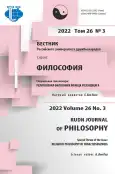Interpretation of the Origin by F. Rosenzweig and M. Heidegger
- Authors: Litvinov M.F.1
-
Affiliations:
- Voronezh State University
- Issue: Vol 26, No 3 (2022): RELIGIOUS PHILOSOPHY OF FRANZ ROSENZWEIG
- Pages: 557-571
- Section: RELIGIOUS PHILOSOPHY OF FRANZ ROSENZWEIG
- URL: https://journal-vniispk.ru/2313-2302/article/view/325308
- DOI: https://doi.org/10.22363/2313-2302-2022-26-3-557-571
- ID: 325308
Cite item
Full Text
Abstract
The research focuses on the problem of interpretation of such a concept as the origin, which is ultimate for philosophical thought and bases existentially oriented constructions of Franz Rosenzweig and Martin Heidegger. It is argues in this paper the fundamental difference between the interpretations of the origin in “The Star of Redemption» and in «Being and Time”, despite all points of intersection and coincidences that bring closer together dialogical and existential-historical thinking. Such differentiation of positions is determined by the necessity both to neutralize romantic connotations, which expose the origin ( Ursprung ) as abyss ( Abgrund ), and to methodologically clarify the possibility not so much to think as to practically assert a limited and unclosed within itself integral being, including ontological and ethical dimensions. The origin of oblivion and renewal, imposed by Heidegger’s hermeneutics of facticity, is contrasted with Rosenzweig's origin of the “eternal overworld”, reconstructed on the basis of Herman Cohen's religio-philosophical intuitions and his analysis of the infinitesimal as a principle of reality. Rosenzweig’s position, which aims at a correlative consideration of the purely logical content of the infinitesimal quantity (almost-Nothing) and the existential experience of the finiteness of everything, is favorably distinguished by the absence of a one-sided focus on recalling, where fore-running although is declared, but it is immediately restrained by being-towards-death. As a result, Rosenzweig’s dialogism turns out to be free from overestimating what Heidegger’s interpretation calls resoluteness, which in fact is not much different from paralysis in the clearance of being. Cohen’s problem of an infinite task's realization, being actualized in Rosenzweig’s conception, allows to go beyond being-towards-death in juxtaposing the trajectories of initial elements into a true gestalt.
About the authors
Maksim F. Litvinov
Voronezh State University
Author for correspondence.
Email: litvinov@phipsy.vsu.ru
ORCID iD: 0000-0003-0161-9254
Candidate of Philosophy, Associate Professor of the Department of History of Philosophy and Culture
1, University square, 394018, Voronezh, Russian FederationReferences
- Dvorkin I. The fire and the rays. The philosophy of judaism and christianity in Franz Rosenzweig’s Star of Redemption. Judaica Petropolitana. 2016;6(1):17—38. (In Russian).
- Macina MR. Le «judéo-christianisme» de Franz Rosenzweig. Revue d'Histoire et de Philosophie Religieuses. 1986;4(66):429—450.
- Rosenzweig F. Star of Redemption. Мoscow: Mosty kultury/Gesharim; 2017. (In Russian).
- Poma A. The Critical Philosophy of Hermann Cohen. Moscow: Akademicheskij proekt; 2012. (In Russian).
- Bielik-Robson A. Franz Rosenzweig: How to Philosophize with the Star. In: Goodchild P., Phelps H., editors. Religion and European Philosophy. Key Thinkers from Kant to Zizek. London: Routledge; 2017. P. 184—195.
- Stepanishchev SA. Plato’s Phaedo and up-to-date continental thought. Vestnik Moskovskogo universiteta im. S.YU. Vitte. Seriya 2: Yuridicheskie nauki. 2014;1(4):22—25. (In Russian).
- Pogorelskaja SW. «Enigmatic parallels». Heidegger and Rosenzweig in contemporary Heideggerian studies. About the books «Shadow of a Star» and «Traces. The Philosophical Path of Martin Heidegger» by S. Möbuß. Chelovek. Obraz i sushchnost’. 2021;4(48):122—128. (In Russ). https://doi.org/10.31249/chel/2021.04.09
- Zizic I. La priere et le temps chez Franz Rosenzweig. Communio. 2017;3—4(251—252): 180—186. https://doi.org/10.3917/commun.251.0180
- Rezvikh TN. The time and cult in the book «The Star of Redemption» by Franz Rosenzweig. Vestnik RGTU. Seriya: Filosofiya. Sociologiya. Iskusstvovedenie. 2016;3(5):74—87. (In Russian).
- Bertolino L. A man as a «citizen of two worlds»: The development of Kantian themes by Rosenzweig. Kantovskij sbornik. 2014;4(50):82—97. (In Russian).
- Kostrova EA. Revelation as Dialogue: God and Self in the «Star of Redemption» by F. Rosenzweig. Russian Journal of Philosophical Sciences. 2011;(7):115—127. (In Russian).
- Sokuler ZA. Hermann Cohen and Philosophy of Dialogue. Мoscow: Progress-Traditsiya Publ.; 2008. (In Russian).
- Bertolino L. Infinitizemal'nyj metod u Germana Kogena, Franca Rozencvejga i Zhilya Delyoza [The infinitesimal method by Hermann Cohen, Franz Rosenzweig and Gilles Deleuze]. Voprosy filosofii. 2018;(3):75—88. (In Russian).
- Levinas E. Dieu et l'onto-théo-logie. In: Dieu, la mort et le temps. Saint-Amand-Montrond (Cher): Grasset; 1993. P. 135—279.
- Heidegger M. Being and Time. Kharkiv: «Folio»; 2003. (In Russian).
- Deleuze G. Bergsonism. In: Empiricism and Subjectivity. Kant’s Critical Philosophy. Bergsonism. Spinoza. Moscow: PER SE; 2001. P. 227—322. (In Russian).
Supplementary files









